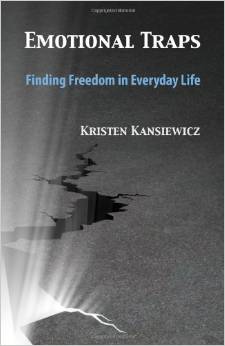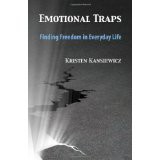The following is an excerpt from my book, Emotional Traps: Finding Freedom in Everyday Life. This portion of the book provides an overview of the TRAPS assessment tool, originally designed for pastors to use with their parishioners. Anyone who is asking, “Am I emotionally healthy?” can get help answering that question using my TRAPS model. If you want to find out more, you can find the entire book here or by clicking on the picture below:
“’What exactly makes a person emotionally healthy?’ This was the question posed to me by my senior pastor that launched the development of this book, and I believe it is a question many Christians are asking today. As churches have become more vocal about the need for counseling, many have begun to make the connection between spiritual growth and emotional health. Books such as Boundaries by Cloud & Townsend as well as Emotionally Healthy Spirituality by Peter Scazerro are examples of books written to help Christians improve life skills and approach their faith journey with emotional balance.
While there are a variety of Christian books available to offer guidance on specific emotional skills, there has not yet been a book devoted to helping Christians assess their own emotional health. Taking a step back and looking at some key areas in your life can help you see a bigger picture of emotional problems that may be holding you back from spiritual growth.
Let me introduce you to the heart and soul of this book: the TRAPS assessment. The following five areas together provide a concrete picture of what makes up one’s emotional health:
Thinking—Are you able to think about your strengths and weaknesses clearly without feeling either prideful or insecure? Do you have a clear sense of how you present yourself to others and how others may see you? Is your understanding and evaluation of events in your life in line with the perspective of mentors or leaders in your life? In this area of emotional health we are looking for self-awareness, insight, and logical, reasonable thinking.
Relationships—Are your relationships moving you forward spiritually and emotionally or dragging you down? Do you interact with others in your life (friends, family, children) in a way that is positive and constructive or are your relationships filled with conflict? Do you have at least 2-3 friends with whom you can share important feelings as well as a larger group or church setting? Here we are looking for a positive and adequate social network as well as identifying your relational patterns and skills.
Addictions—Do you have anything in your life that you are dependent on besides God? Addictions can be to substances like nicotine, alcohol, caffeine, or drugs as well as to food, sex, gambling, television, the internet, money, etc. You might be tempted to skip over this area if you have not been addicted to drugs, but it is important to look for any area in which you may be dependent.
Past—For so many of us, our past continues to impact our present-day lives. For some, there is past trauma or abuse that continues to shape how they see themselves and others. For others, their own mistakes of the past fill them with so much guilt and shame that they feel they can never truly accept God’s forgiveness and be free. In assessing this area, focus both on past trauma/abuse AND on shame from past sins or mistakes.
Self-care—Sometimes the everyday, mundane routines can be as critical to emotional and spiritual health as any of the other four areas. Habits such as eating well, regular exercise, good sleep patterns, clear task and time management, and even proper money management are essential to a balanced emotional life. How do you handle stress day-to-day? Do you have positive coping skills like journaling or hobbies? Do you demonstrate a level of self-discipline and a healthy lifestyle?
In Chapter 1 we will look at the need for addressing emotional issues in the process of spiritual growth. I will lay out a biblical framework for emotional health: what does God say about taking care of our emotional lives? What role does this have in the process of becoming more like Christ? Chapters 2-6 will take an in-depth look at each of the areas in the TRAPS assessment, focusing on specific problem areas and red flags. Chapter 7 will offer practical suggestions for moving forward once emotional traps have been identified. The final chapter will address medications, including why they are sometimes necessary and why Christians should not be afraid to take medications when they are needed. In the appendix you will find a 100-question assessment tool that you can use as a starting point for personal reflection.
Perhaps you are still not quite sold on the emotional/spiritual connection. Isn’t the Bible all you need to address life’s problems? Some Christians have this point of view: emotional problems derive from sin. Symptoms of depression or anxiety are seen as a result of one’s own sinful lifestyle and behaviors. While it is true that we live in a sin-filled and cursed world, not all emotional problems stem from a specific sin you have committed. Your emotional life is far more complex than this, and there are often factors out of your control that contribute to emotional health problems. I hope that this book can help you understand the big picture of emotional health and offer some ideas for moving forward one step at a time.
Galatians 5:1 says, ‘It is for freedom that Christ has set us free. Stand firm, then, and do not let yourselves be burdened again by a yoke of slavery’ (NIV). I pray that this book will greatly benefit you and help you move forward emotionally and spiritually so that we all may experience the freedom Christ has for us in our everyday lives.”
Click here to check out Kristen’s online course, a self-paced resource to help you work through this book as well as her other books focused on emotional freedom!


